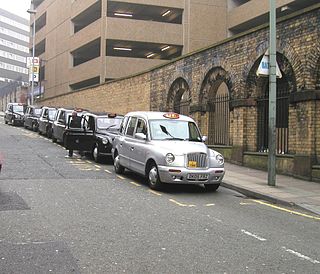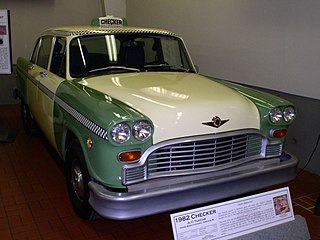
The Interstate Commerce Commission (ICC) was a regulatory agency in the United States created by the Interstate Commerce Act of 1887. The agency's original purpose was to regulate railroads to ensure fair rates, to eliminate rate discrimination, and to regulate other aspects of common carriers, including interstate bus lines and telephone companies. Congress expanded ICC authority to regulate other modes of commerce beginning in 1906. Throughout the 20th century, several of ICC's authorities were transferred to other federal agencies. The ICC was abolished in 1995, and its remaining functions were transferred to the Surface Transportation Board.

A hackney or hackney carriage is a carriage or car for hire. A hackney of a more expensive or high class was called a remise. A symbol of London and Britain, the black taxi is a common sight on the streets of the UK. The hackney carriages carry a roof sign TAXI that can be illuminated at night to indicate their availability for passengers.

Yellow cab taxicab operators exist all around the world. The original Yellow Cab Company, based in Chicago, Illinois, was one of the largest taxicab companies in the United States.

Checker Motors Corporation was a Kalamazoo, Michigan, vehicle manufacturer and tier-one subcontractor that manufactured taxicabs used by Checker Taxi. Morris Markin established the company in 1922, initially named the Checker Cab Manufacturing Company, in Chicago through a merger of Commonwealth Motors and Markin Automobile Body. The manufacturer moved to Kalamazoo in 1923 and was renamed to Checker Motors in 1958.
Erie Railroad Co. v. Tompkins, 304 U.S. 64 (1938), was a landmark U.S. Supreme Court decision in which the Court held that the United States does not have a general federal common law and that U.S. federal courts must apply state law, not federal law, to lawsuits between parties from different states that do not involve federal questions. In reaching this holding, the Court overturned almost a century of federal civil procedure case law, and established the foundation of what remains the modern law of diversity jurisdiction as it applies to United States federal courts.
Federal common law is a term of United States law used to describe common law that is developed by the federal courts, instead of by the courts of the various states. The United States is the only country to combine the creation of common law doctrines with a complete federalism, wherein the national supreme court has virtually no power to review state court decisions to determine whether the state courts have followed state laws. The High Court of Australia is sometimes said to have federal common law, but because all state and territorial courts are directly appealable to the High Court, this is indistinguishable from a general common law. In contrast, the United States Supreme Court has effectively barred the creation of federal common law in areas traditionally under the authority of state courts. Nevertheless, there are several areas where federal common law continues to govern.

The Erie doctrine is a fundamental legal doctrine of civil procedure in the United States which mandates that a federal court called upon to resolve a dispute not directly implicating a federal question must apply state substantive law.
Swift v. Tyson, 41 U.S. 1 (1842), was a case brought in diversity in the Circuit Court for the Southern District of New York on a bill of exchange accepted in New York in which the Supreme Court of the United States determined that United States federal courts that heard cases brought under their diversity jurisdiction under the Judiciary Act of 1789 must apply statutory state laws when the state legislatures in question had spoken on the issue, but did not have to apply the state's common law if the state legislatures had not spoken on the issue.

In New York City, taxicabs come in two varieties: yellow and green; they are widely recognizable symbols of the city. Taxis painted yellow are able to pick up passengers anywhere in the five boroughs. Those painted apple green, which began to appear in August 2013, are allowed to pick up passengers in Upper Manhattan, the Bronx, Brooklyn, Queens, and Staten Island. Both types have the same fare structure. Taxicabs are operated by private companies and licensed by the New York City Taxi and Limousine Commission (TLC). It also oversees over 40,000 other for-hire vehicles, including "black cars", commuter vans, and ambulettes.
Taxicabs within a country often share common properties, but there is a wide variation from country to country in the vehicles used, the circumstances under which they may be hired and the regulatory regime to which these are subject.
The taxicabs of the United States make up a mature system; most U.S. cities have a licensing scheme which restricts the number of taxicabs allowed. As of 2012 the total number of taxi cab drivers in the United States is 233,900; the average annual salary of a taxi cab driver is $22,820 and the expected percent job increase over the next 10 years is 16%.

Taxicabs are regulated throughout the United Kingdom, but the regulation of taxicabs in London is especially rigorous with regard to mechanical integrity and driver knowledge. An official report observed that: "Little however is known about the regulation by anyone outside the trade. The Public Carriage Office (PCO), which regulates and licenses taxis and private hire was transferred from the Metropolitan Police to become part of Transport for London in 2000." In 2015, there were around 298,000 licensed drivers in England, of which 164,000 were private hire licences, 62,000 were taxi licences and 72,000 were dual licences.

The Historic Railpark and Train Museum, formerly the Louisville and Nashville Railroad Station in Bowling Green, Kentucky, is located in the historic railroad station. The building was placed on the National Register of Historic Places on December 18, 1979. Opened in 1925, the standing depot is the third Louisville & Nashville Railroad depot that served Bowling Green.
Prima Paint Corp. v. Flood & Conklin Mfg. Co., 388 U.S. 395 (1967), is a United States Supreme Court decision that established what has become known as the "separability principle" in contracts with arbitration clauses. Following an appellate court ruling a decade earlier, it reads the 1925 Federal Arbitration Act (FAA) to require that any challenges to the enforceability of such a contract first be heard by an arbitrator, not a court, unless the claim is that the clause itself is unenforceable.

A taxi, also known as a taxicab or simply a cab, is a type of vehicle for hire with a driver, used by a single passenger or small group of passengers, often for a non-shared ride. A taxicab conveys passengers between locations of their choice. This differs from public transport where the pick-up and drop-off locations are decided by the service provider, not by the customers, although demand responsive transport and share taxis provide a hybrid bus/taxi mode.

Cars such as Toyota Etios, Maruti Omni, Mahindra Logan, Maruti Suzuki, Tata Indica and Tata Indigo are fairly popular among taxicab operators. The livery of the taxicabs in India varies from state to state. In Delhi and Maharashtra, most taxicabs have yellow-black livery, while in West Bengal, taxis have yellow livery. Private taxicab operators are not required to have a specific livery. However, they are required by law to be registered as commercial vehicles.

Checker Taxi was a dominant taxicab company and national franchisor that was based in Chicago, Illinois. Checker Motors was an American vehicle manufacturer based in Kalamazoo, Michigan that built the iconic Checker Taxicab, sold commercially as the Checker Marathon until 1982. Both companies were owned by Morris Markin by the 1930s.
Steele v. Louisville & Nashville Railway Co., 323 U.S. 192 (1944), is a United States Supreme Court case, concerning U.S. labor law, specifically, the responsibility of every formally recognized labor organization to equally represent all the members of their class or craft, under the Fair Labor Standards Act (FLSA). In particular, the Court ruled that the Act covered employees regardless of whether any particular individual(s) are, or are not, members of the duly recognized labor organization labor unions.
Transport and bus boycotts in the United States were protests against the racial segregation of transport services before the passage of the 1964 Civil Rights Act, which outlawed forms of discrimination.











